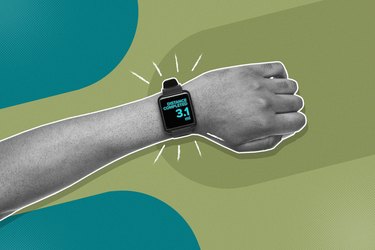
If you regularly go running 3 miles a day, you've developed a fantastic habit for reaching your weight-loss goals. The key to losing weight is establishing a calorie deficit, or burning more calories than you take in, and running is great for burning calories.
But, depending on your eating habits, you might need to make those runs a little longer, or make a few healthy, sustainable tweaks to your diet to see the fat really come off. Plus, running every single day may not give your body enough time for rest and recovery.
Video of the Day
Video of the Day
Tip
If you're running 3 miles a day and sticking to a nutrient-rich diet, odds are good that you're exercising enough to burn body fat.
Fat-Burning Benefits of Running 3 Miles a Day
The basic rule of weight loss is that you have to establish a calorie deficit or, to put it another way, you must burn more calories than you take in. Although every little bit of physical activity you do counts toward that deficit, running is particularly effective because it burns a lot of calories quickly.
The exact number of calories you burn during a workout depends on many factors, including your weight, body composition and how hard you work out.
But running statistics from Harvard Health Publishing offer a good place to start calculating just how quickly the weight might come off and how long it will take you to run 3 miles.
Weight (lbs.) | Pace (mph) | Pace per Mile (min.) | Calorie Burn | How Long Does It Take? (min.) |
|---|---|---|---|---|
125 | 5 | 12:00 | 240 | 36 |
155 | 5 | 12:00 | 288 | 36 |
185 | 5 | 12:00 | 336 | 36 |
125 | 6 | 10:00 | 360 | 30 |
155 | 6 | 10:00 | 420 | 30 |
185 | 6 | 10:00 | 495 | 30 |
125 | 7.5 | 8:00 | 375 | 24 |
155 | 7.5 | 8:00 | 450 | 24 |
185 | 7.5 | 8:00 | 525 | 24 |
It's generally considered safe to create a calorie deficit of 500 to 1,000 calories a day. That puts you roughly on track to lose 1 to 2 pounds a week, according to the Mayo Clinic. If running 3 miles a day helps make this a sustainable rate for you, you could lose 10 pounds in 5 to 10 weeks or 30 pounds in 4 to 7 months, for example.
Tip
Those weight-loss estimates may not sound as dramatic as the promises made by fad diets, but they are sustainable. Unlike extreme weight-loss programs, making regular exercise a part of your daily life will help you not only lose the weight but also keep it off over the long term. And don't forget, weight is not the only way to measure health.
Disadvantages of Running 3 Miles a Day
Most people find they need at least one day of rest or active recovery workouts like walking to balance out their more intense workouts — and if you're just starting out, you might need more frequent rest.
Let your body be the guide to whether you're working too hard. Although you might feel tired at the end of your run, the overall net effect of regular exercise should be more energy in your everyday life.
If you find yourself experiencing classic symptoms of overtraining, such as excessive fatigue, trouble sleeping, irritation, loss of appetite or nagging injuries, you may need to dial back your running workouts, according to the American Council on Exercise.
If the overtraining symptoms don't recede as you dial things back, it's time to speak with a medical professional to find out if something else might be behind your symptoms.
Consider cross-training for at least some of your workouts. An elliptical trainer or even water jogging in a swimming pool can help you burn calories and get your heart rate up without stressing your joints with the impact of running.
Don't Ignore Your Diet
What you eat can also support your efforts to lose weight with running. Start by focusing on these healthy diet choices from the Department of Health and Human Services:
- Eat a variety of colorful vegetables and fruits.
- Choose low-fat dairy foods.
- Opt for high-quality protein sources such as fish, nuts and lean meats.
- Limit your intake of saturated and trans fats, sodium and added sugar.
- Consume alcohol in moderation, if at all.
To establish your calorie deficit, either slightly decrease your calorie intake or increase your level of physical activity. You shouldn't cut your calories below 1,200 to 1,500 a day or you could cause health complications.
Other Lifestyle Habits That Affect Weight
You might find you're running 3 miles a day and diligently tracking your calorie intake, yet you're still not reaching your weight-loss goal. It might be time to look at some of your other lifestyle habits.
Getting enough sleep helps you manage food cravings and keeps hormones in balance in ways that can support your weight-loss journey. And managing your stress can help keep your metabolism humming and make you more inclined to sleep better and exercise regularly.
Keep in mind your body size is also a matter of genetics and can be affected by underlying health conditions or medications. Talk to a trusted health care professional about a healthy weight for you.
How to Start Running 3 Miles a Day
Beginners shouldn't immediately start running 3 miles a day. Instead, run for a few minutes or just 1 mile and gradually build up in distance over time. If you're already comfortable running 3 miles, you can gradually pick up your pace per mile.
Make sure you have comfortable running shoes and consider running on softer surfaces, such as wood chips, dirt or grass, to lessen some of the impact. Other running gear like running belts, running watches, running socks and running sunglasses can help you stay comfortable and on pace during your daily 3 miles.
Before a run, take a few minutes to do some stretches and a dynamic warmup to get your muscles ready to work.
Make sure you have a safe, outdoor environment for running or a high-quality treadmill at home or a gym. If you've never run before, get your doctor's approval before starting any new kind of physical activity.
Was this article helpful?
150 Characters Max
0/150
Thank you for sharing!
Thank you for your feedback!





